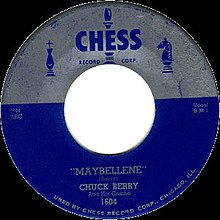Maybellene
| "Maybellene" | ||||||||||
|---|---|---|---|---|---|---|---|---|---|---|
 |
||||||||||
| Single by Chuck Berry | ||||||||||
| from the album Chuck Berry Is on Top | ||||||||||
| B-side | "Wee Wee Hours" | |||||||||
| Released | July 1955 | |||||||||
| Format | 7" 45-RPM, 10" 78-RPM | |||||||||
| Recorded | May 21, 1955, Universal Recording Studios, Chicago, Illinois | |||||||||
| Genre | Rock and roll, rockabilly | |||||||||
| Length | 2:19 | |||||||||
| Label | Chess | |||||||||
| Writer(s) | Chuck Berry | |||||||||
| Producer(s) | Leonard Chess, Phil Chess | |||||||||
| Chuck Berry singles chronology | ||||||||||
|
||||||||||
"Maybellene" is one of the first rock-and-roll songs. It was written and recorded in 1955 by Chuck Berry, and inspired/adapted from the Western Swing fiddle tune "Ida Red," which was recorded in 1938 by Bob Wills and his Texas Playboys. Berry's song tells the story of a hot rod race and a broken romance. It was released in July 1955 as a single by Chess Records, of Chicago, Illinois. It was Berry's first single and his first hit. "Maybellene" is considered one of the pioneering rock-and-roll songs: Rolling Stone magazine wrote, "Rock & roll guitar starts here." The record is an early instance of the complete rock-and-roll package: youthful subject matter; a small, guitar-driven combo; clear diction; and an atmosphere of unrelenting excitement. The lyrics describe a man driving a V8 Ford chasing his unfaithful girlfriend in her Cadillac Coupe DeVille.
The song was a major hit with both black and white audiences. It has received numerous honors and awards. Soon after its initial release, cover versions were recorded by several other artists. The title is misspelled "Maybelline" on several releases.
"Maybellene" has been described as an adaptation of the Western Swing song "Ida Red", as recorded by Bob Wills and His Texas Playboys in 1938. According to Berry, Wills's version, an uptempo dance number, was his favorite song to sing at racially integrated clubs (“salt and pepper clubs”, as he called them). Encouraged by Muddy Waters, in 1955 Berry brought to Chess Records a recording of his version of Wills's song, which he had renamed "Ida May", and a blues song he wrote, “Wee Wee Hours”, which he said was inspired by Big Joe Turner’s “Wee Baby Blue”. To Berry’s surprise, Leonard Chess showed little interest in the blues material but was enthusiastic about the commercial possibilities in a “hillbilly song sung by a black man”. Chess wanted a bigger beat for the song and added a bass and a maracas player to Berry's trio at the recording session. He also thought the titles “Ida Red” and “Ida May” were “too rural”. Spotting a mascara box on the floor of the studio, according to Berry’s pianist Johnnie Johnson, Chess said, “Well, hell, let’s name the damn thing Maybellene” altering the spelling to avoid a suit by the cosmetic company. The lyrics were rewritten, also at the direction of Chess. “The kids wanted the big beat, cars and young love,” Chess recalled. “It was the trend and we jumped on it.”
...
Wikipedia
